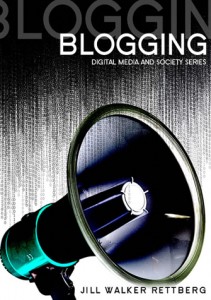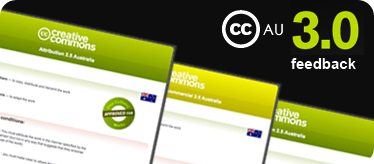Home » teaching and learning (Page 5)
Category Archives: teaching and learning
An Anthropological Introduction to YouTube
Michael Wesch, an anthropologist focused on digital culture and YouTube (famous for the the videos The Machine is Us/Ing Us and A Vision of Students Today) has released (on YouTube) an excellent presentation he gave about YouTube’s history and cultural impact called An Anthropological Introduction to YouTube:
While much of the story Wesch presents will be familiar, this 55 minute package is an excellent overview and will no doubt prove an excellent resource for getting students thinking about the place of YouTube in digital culture. Beside which, it features a whole bunch of old favourites which should make it enjoyable viewing for almost everyone. (If a 55 minute YouTube clip is a bit much, Wesch has posted a timeline for the video in his blog, so pick up the story wherever you’re most interested.)
Creative Commons Australia – 3.0 License Drafts and more…
I’ve been meaning to post about all the exciting things Creative Commons Australia have been up to since I returned from the fabulous Building an Australasian Commons national conference (and the linked Creating Value: Between Commerce and Commons international conference), but it’s taken a few weeks so first off I want to draw your attention to the Creative Commons Australia 3.0 draft licenses which have been ported to Australia, bringing CCau up to date with the global 3.0 releases. The licenses are in draft form and open for comment now, so I’d encourage you to take a look and leave comments if any come to mind. This version is more directly based on the CCNZ 3.0 licenses which are considerably more understandable for the layperson (ie non-lawyer, like me). The public comment phase has been going for a while, and for comments to be addressed before the official release they need to be made by 1 August 2008 (yes, I should have mentioned this earlier, but go look now, you’ve still got a couple of weeks).
Equally exciting, a global project spearheaded by Creative Commons Australia has been released: the Creative Commons Case Studies project. One of the biggest challenges when explaining Creative Commons licenses to other people was the lack of examples. Sure, we can all talk about Cory Doctorow’s exemplary book licensing, but there are so many other projects out there using CC licenses to share, publicise and allow others to build upon and remix their work. Well, the Case Studies project makes life a whole lot easier, collating a wealth of examples from across the globe when groups, bands, corporations, universities and more have used CC licenses. Each case study features an overview, how the CC license is used, and the motivations for choosing a CC license; this structure ensures that we understand what CC licenses can achieve and the various philosophies behind their use (from philanthropic to purely promotional). The best part, though, is that the Case Studies project is wiki-based, meaning anyone who wants to can add an example either of their own use, or of someone else’s exemplary work under CC. I’ve got a couple of examples of past work with my students I’ll by adding soon, and I hope if you’ve been using CC licenses either in education or anywhere else, you might want to consider documenting your best examples to share with the world, too.
UWA Student News on Channel 31 THIS FRIDAY

With Perth’s community broadcaster, Access 31, alive for a while longer, it’s my great pleasure to announce that the eight best news projects from students in my Digital Media (Comm2203) unit this semester will be screening as a half an hour programme this Friday night (11 July, 2008) on channel 31 at 8pm. There are some very impressive segments in here, including several news stories which engage with critical issues for Perth right now, and about larger issues such as media and the upcoming Olympics. If you’re near a TV (and in Perth) this Friday at 8pm, please tune in and take a look!
For a sample of what’s going to be screened take a peak at this post.
Links for July 3rd 2008
Interesting links for July 3rd 2008:
- Virtual Worlds Research: Past, Present and Future (Vol 1, No 1) [Journal of Virtual Worlds Research] – The inaugural issue of the Journal of Virtual Worlds Research is out, showcasing some excellent research and situating virtual worlds in an ongoing and dynamic research context. It’s also an exemplar of open publishing: all content is online and under Creative Commons licenses.
- Uni cheats outsource to India [The Age] – “Computer Science students are farming out their coursework to cheap programmers in countries like India and university staff admit they are powerless to detect and prevent it….Various well-established sites already sell students essays and other written work.”
- Is YouTube Killing Video Originality? [NewTeeVee] – “…more people are creating …video than ever before… The issue becomes when people start creating for the playcounts. What?s the fastest way to rack up a million plays on YouTube, land an agent and get on Oprah? It?s not by making something new!”
- VioletBlue VioletBlue – An archive of all of the posts that Boing Boing deleted in relation to sex blogger Violet Blue. Looking through this archive, it’s hard to see how these deletions haven’t damaged Boing Boing’s historical presence.
- Firefox download record official [BBC NEWS | Technology] – Mozilla has officially made history with a new Guinness world record for the largest number of software downloads in a 24-hour period. The final record breaking 8,002,530 downloads for Firefox 3.0 took place in June with parties in over 25 countries.
Blogging (the book) by Jill Walker Rettberg

I’m delighted to see that Jill Walker Rettberg’s book Blogging has just been released. I had the pleasure of reading much of this book in draft form last year while Jill was a guest researcher here in Communication Studies here at UWA, and on the basis of what I read I’m confident this book will be extremely well received. Jill’s work is neither a simple how-to guide (of which there are many), nor is it a book on blogging which presumes readers are already blogosphere aficionados. Rather, Jill has managed to write an engaging and critical book which situates blogging within broader histories – such as the role of blogging in terms of literacy, the evolution of citizen journalism, blogs and/as social networks, and even ethical frameworks which examine advertising and authenticity in blogs. More to the point, for someone new to blogs as an idea, or in practice, Blogging offers a world of insight and experience distilled into a readable and engaging form.
The table of contents and the (extremely positive) early reviews of Blogging are available on Polity’s website, and it can be ordered now from Amazon UK or will be available from Amazon US in about two months.
I strongly recommend you read Blogging for yourself!

